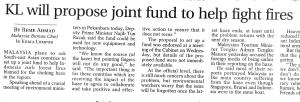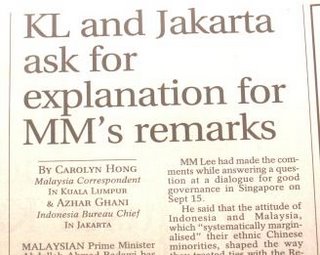Friday, October 27, 2006
How Long Will Spring Last
I am referring of course not to the spring season here in Singapore, but the name of our statutory board in charge of standards, productivity, innovation and growth. I ask this question because it was reported last week that Mr Philip Yeo, the high-flying superstar chairman of A-Star is going to take over this stat board that was formerly known as NPB or National Productivity Board, and later renamed Productivity and Standards Board or PSB; and later renamed yet again to SPRING Board. You might recall that some MPs even poked fun at the name in parliament saying they thought it was the name of a karaoke lounge.
As it appears that every time a top civil servant or new minister takes up a new appointment, one of the first things he or she does was to change the name of that organization, I anticipate that there might just be going to be another name change at Bukit Merah Central.
I often suspect there is some kind of institute for public administration and government in this country where they teach these top guns how to think out of the box and fix things even if they ain’t broke. In preparing to take over a new ministry or department, the first of the 10 steps is to change the name, preferably to something catchy like Spring or A-star. For example, the chairmanship of the Feedback Unit was recently taken over by Ms Amy Khor, and the first announcement to come about was a name change to REACH.
I admit that I am rather old-fashioned and resistant to change. So I am quite prepared to accept that people younger and more dynamic than me should like to change things for the sake of progress. But don’t you think that we have too many name changes in this country. Haven’t they heard of Shakepeare’s famous line, “A rose by any other name would smell as sweet”? I am really hard-pressed to think of a stat board or ministry that has not undergone one or more name changes in recent years. Just the other day, I overheard my colleague telling an overseas associate about the ROC (Registry of Companies). I had to tell him that he was at least 2 generations behind time. ROC has been renamed RCB (Registry of Companies and Businesses) and recently to ACRA (please don’t ask me what it stands for; I only know it is some kind of authority).
Personally, I find that most of these name changes are unnecessary and irritating. And they must cost a bundle to implement; quite apart from the additional stress brought on our already highly stressed and over-worked public sector employees. I have met some of them in the course of my work, and they often complain about having to attend so many training programmes on topics like creativity and innovation, GEMS (not jewelry but customer service), Singapore Quality Class, Innovation Class, Quality Control Circles; which by the way has undergone 2 name changes, first to Quality Circles or QC and later Innovation and Quality Circles or IQC and so on. Anything those consultants come up with, our ministries want to implement.
The type of name change I really dislike are those where the original meaning is lost. I give you a couple of examples.
SAFTI originally stood for Singapore Armed Forces Training Institute. Later they wanted to build a new one next door. However, they want to retain the name SAFTI, so what did they do? They called it; Safti Military Institute. So now the acronym SAFTI has lost its meaning because the new institute certainly isn’t called Singapore Armed Forces Training Institute Military Institute in full. So if some foreign military trainee were to be attached to our new Safti and asked the instructor; “Sir, what does Safti mean?” the poor instructor is going to have a tough time explaining.
Second Example: The training and consultancy arm of PSB was privatized when the new name Spring was adopted. The new organization was called PSB Corporation. Likewise it certainly does not stand for Productivity and Standards Board Corporation does it? Recently, it was acquired by a German company and things got even more confusing; it’s now TUV SUD PSB.
Third example: SAFRA. It used to stand for Singapore Armed Forces Reservists Association. But the powers at Mindef did not like the word reservist because it suggests that our civilian soldiers are not operationally ready; so the term Reservists was change to Operationally Ready NSMen. But they want to retain the ‘brand’ SAFRA. So they renamed it Safra NS Association (or something like that) and the word Safra lost its meaning.
I am sure you can think of several more.
But there is one type of name change I dislike even more. You might recall some years ago, the government was trying to promote the use of Mandarin over Chinese dialects. Overnight some over smart-alec civil servant decided to rename places like Nee Soon to Yishun, Ow Kang to Hougang, Tekka to Zhu Jiao etc. But then they probably received feedback that it was a stupid idea (maybe they did not ‘Reach’ far enough for feedback) and so they stopped the job halfway. And today we have a mixture of Hanyu Pinyin and Dialect names like Ang Mo Kio, Choa Chu Kang, Yio Chu Kang.
But anyway, we should be thankful they did not engage some Hollywood-trained consultant to advise us on how to fix our names that ain’t broke. Otherwise, we could very well end up having our Chinese ancestors’ names being reversed, like what they did to the famous film star Zhang Ziyi. Just imagine being admitted to Tock Seng Tan Hospital!
But the name change that takes the cake is the one that went one full circle and cost us the taxpayers a whopping 240 grand. I think you probably know I am referring to the famous Marina Bay branding exercise. They paid that obscene amount to a consultant to come up with a new name. But the poor guy could not come up with a better name and so they retained the old name.
But don’t give up yet, all you name-change fans. Just send in our A-Star, I mean superstar chairman and who knows, he just might be able to pull something out of the box; sorry I mean outside the box.
Friday, October 13, 2006
Going Beyond Words
 Malaysia’s Deputy Prime Minister Najib Tun Razak has a brilliant idea to solve the haze problem. According to a Straits Times report today, he wants South-east Asian countries to set up a fund to help Indonesia curb forest fires blamed for the choking haze in the region. Speaking ahead of a crucial meeting of environment ministers in Pekanbaru today, he said the fund could be used for new equipment and technology.
Malaysia’s Deputy Prime Minister Najib Tun Razak has a brilliant idea to solve the haze problem. According to a Straits Times report today, he wants South-east Asian countries to set up a fund to help Indonesia curb forest fires blamed for the choking haze in the region. Speaking ahead of a crucial meeting of environment ministers in Pekanbaru today, he said the fund could be used for new equipment and technology.“We know the source (of the haze) but pointing fingers will not do any good. The important thing is for these countries which are receiving the impact of the haze to agree to collaborate and take positive and effective action to ensure that it does not recur.”
Now I understand what he meant when he said at the 5th Shangri-la Dialogue, in Singapore, on June 4 2006 that "We need to go beyond words."
Doesn’t the minister know that even money donated for victims of the 2004 Indian Ocean Tsunami disaster have not reached them after 2 years. By the time our money reach the right people to purchase the equipment and technology he spoke about, there may not be any more forests left to burn.
I have a better idea. We should collect all the money in cash, and then burn them in front of Indonesia’s Environment Ministry (if they have one) sometime in June next year; just before the annual forest burning ritual begins. Then when they see the smoke of our precious dollars burning, they will be reminded to do something. This is because, “environmental watchers worry that the issue will be forgotten once the latest haze ends, at least until the problem returns with the next dry season.”
Wednesday, October 04, 2006
Indonesian Chinese Marginalized?


Minister Mentor Lee Kuan Yew’s recent remarks about the Chinese being marginalized have expectedly drawn loud protests and expressions of indignation from politicians in Indonesia.
These people really have the cheek. Before they dare to demand an explanation from MM Lee, I would suggest that they first give a proper account of the events of 1998. Lest some of you have forgotten, that was the year when many Chinese were killed and Chinese women systematically raped. Instead of summoning our ambassador, perhaps they should summon the BBC or CNN. Just look at some of these reports:
Orchestrated attacks
In what appeared to be a well organised operation, anti-Chinese sentiment was mobilised - many believed by the army - to create chaos in the city.
Hundreds of people were killed, homes and businesses were burned to the ground, ethnic Chinese women were systematically raped and in some cases stripped in public.
Source: BBC News SPECIAL REPORT: The Chinese dilemma, June 1, 1999
Team finds no proof of mass rapes
Women's groups have said at least 168 Chinese women and girls were raped during the May riots.
But a government fact-finding team said it had not found any proof ethnic Chinese women were raped during previous riots, Antara reported Saturday.
Women's Affairs Minister Tutty Alawiah, one of the leaders of the investigation, echoed military chiefs who said earlier this week that they had failed to find evidence of mass rapes.
"The team has been conducting an investigation for one and a half months now but has found no woman who fell victim to gang rape or who claimed to have been raped during the May riots," Antara quoted Alawiah as saying.
Human rights activists say rape victims may be unwilling to seek help because of the stigma associated with the crime and because they may view police as being corrupt.
Source: CNN - Anti-Chinese riots continue in Indonesia - August 29, 1998

"The murderer intended to send us a message that they could really kill," said Karlina Leksono of the Volunteers for Humanity.
"People will now be afraid to tell anyone what happened during the riots. This is terrorising for Indonesia's ethnic Chinese," said Ester Indahyani Jusuf Lubis, leader of Serambi Nusa Bangsa, a group formed to fight racial discrimination.
During the May riots many businesses and homes of the ethnic Chinese minority were targeted by mobs.
The reports of mass rapes outraged Chinese communities around the world and resulted in calls for tough action by the governments of China, Taiwan and Hong Kong.
BBC News: Indonesian rape counsellor murdered, October 10, 1998.
Rape or no rape … I think you can decide for yourself.
Maybe MM Lee was wrong after all, to say that Chinese in Indonesians are marginalized. Terrorized or brutalized may be a better word.
For further reading:
1) BBC News SPECIAL REPORT Indonesia '98: A year of living dangerously
2) BBC News ASIA-PACIFIC Analysis: South-East Asia's Chinese